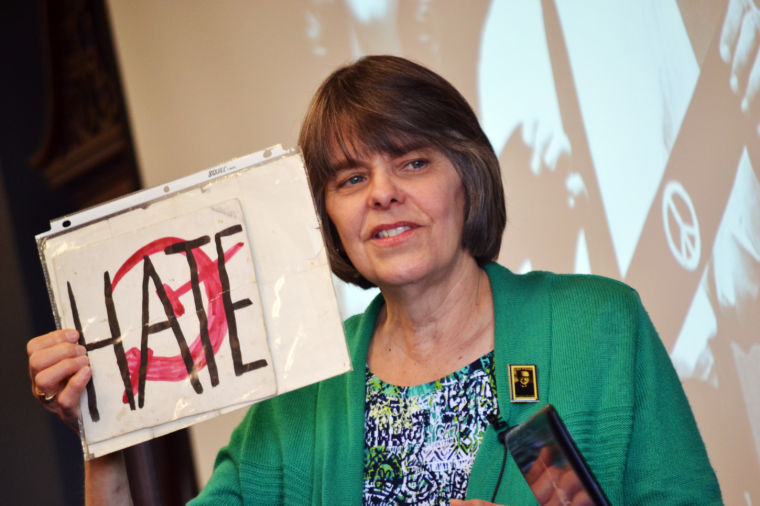Tinker Tour
Mary Beth Tinker shares her experiences fighting for freedom of speech during a Coffee and Politics lecture in Bryan 308, Monday, April 28.
April 29, 2014
Mary Beth Tinker took the Des Moines Independent School District in Iowa to the Supreme Court for violating her First Amendment rights when she was just 13 years old.
A pioneer of free speech in schools, Tinker spoke to students and community members Monday as part of the Foley Institute’s Coffee and Politics lecture series. The event, co-hosted by The Edward R. Murrow College of Communication, allowed Tinker to share her story 45 years later and discuss First Amendment rights.
“This is a time where there are great issues that young people should be speaking up about, and are speaking up about,” Tinker said. “This is the kind of time that I grew up in, in the 1950s and ‘60s.”
Common issues today such as economic inequality, war and racism are all issues that were present decades ago and deserve to be spoken about, Tinker said.
Calling her tour around the nation a “Tinker Tour,” Tinker said she is traveling to talk to students about their free speech rights and the importance of carrying them out.
“When something happens that you don’t think is right, you can do two things,” Tinker said. “You can do nothing, or you can do something.”
Tinker recounted the story of how she wore a black armband with a peace sign on it to school in eighth grade to represent those who had died during the Vietnam War.
“It was to mourn the dead on both sides of the war, which made it controversial,” Tinkers said.
After being suspended from school for wearing the armband, the case was picked up by the American Civil Liberties Union (ACLU) and was eventually appealed all the way through to the Supreme Court.
Tinker said after the Supreme Court defended First Amendment rights for students and teachers alike, she did not initially comprehend the impact of the decision.
It was not until much later when she realized that being suspended for exercising free speech truly made a difference in others’ lives, she said.
“She gave me my suspension forms, but she also gave me a lifetime of being able to tell young people that a shy girl from Iowa with an ounce of courage can make a difference,” Tinker said.
Although Tinker made a large impact on student’s rights to the first amendment, there are always issues to address with free speech, said senior psychology major Marielle Maxwell.
“I can definitely see examples of it in other schools where there is any instance of one group being held below another,” Maxwell said.
Freshman communication major Jensen Merrill said he thinks Tinker’s actions and the subsequent Supreme Court case made a large impact on the way free speech is practiced throughout schools today.
This right is necessary in order to feel confident in their education, he said.
“Free speech in school is what makes students feel as if they have the right to voice their opinions,” Merrill said. “It lets them feel like they have the opportunity to make a change.”
However, with free speech, the negative speech has just as much right to be expressed as the positive, Maxwell said.
“You’ve got to practice the gross speech as much as the good speech,” Maxwell said.
Tinker said hate speech, as well as hateful actions, is a common controversy when speaking about First Amendment rights.
“Of course there are limits to the First Amendment, but where those limits are is always where the great controversy comes in,” Tinker said. “That’s what democracy has always been grappling with – the balance between speech and security.”




















